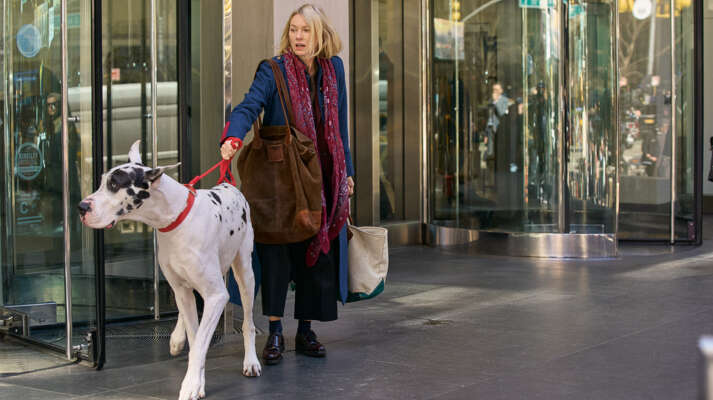Robert Forster's Long Journey
What They Had's veteran actor brings a lifetime of experience to his role
Robert Forster's Long Journey
Written by Peter Bowen
In Elizabeth Chomko's What They had, Robert Forster plays Bert, a husband forced to confront a family crisis precipitated by his wife Ruth (Blythe Danner)-who suffers from memory loss-wandering off into the snow one night. His daughter Bridget (Hilary Swank) and her daughter Emma (Taissa Farmiga) fly back to Chicago from Los Angeles. His son Nick (Michael Shannon), who still lives in Chicago, pushes for Ruth to be treated at a memory care facility. But Bert just wants his wife to stay at home so he can care for her. A former military man and devout Catholic, Bert embodies the old-fashion values of loyalty and service he grew up with. "The way Bert looks at life is that you do the right thing," Chomko notes. "Robert got that moral compass so instinctively." His profoundly moving performance as a man loyal to a fault is receiving singular attention. The Observer spotlights him as "the standout in the stellar ensemble," adding "If the newly expanded Academy does its job correctly, he will be nominated again this year" for an Academy Award."
After fifty years as a working actor, Forster understands firsthand his character's stalwart sense of duty. "There's a nobility in doing what you are supposed to do and getting to the important stuff now, including taking care of your family," explains Forster. Having gone through major ups and downs in his professional career, Forster lets his experiences fuel a more profound sense of humanity in the roles he plays. As The Washington Post notes of his career, "Wherever he went when he disappeared, he didn't forget how to act, and it might be said also that of all the men of his acting generation, he's aged the best."
Acting was not Forster's childhood dream, even though he comes from an entertainment background. His father was an elephant trainer for the Barnum & Bailey Circus. During his senior year at the University of Rochester, just as he was preparing for a future in law, Forster's life was turned upside down when, as he told Vulture, "I was struck by lightning" after spotting a woman in "a black leather raincoat and high heels." After following her to an audition for Bye, Bye, Birdie, his life changed in two drastic ways. He decided to become an actor and that woman, June Provenzano, became his first wife. Moving to New York City in 1965, he made his Broadway debut opposite Arlene Francis in William Hanley's Mrs. Dally Has A Lover. When his part got an enthusiastic mention in The Hollywood Reporter's "Broadway Ballyhoo" column, 20 th Century Fox called him in for a screen test. Within a year, John Huston cast him in Reflections in a Golden Eye as the handsome, sometimes naked army private who becomes the object of desire for both Elizabeth Taylor and Marlon Brando's characters.

By the late sixties, Forster had become the next big thing. In 1968, he appeared opposite Gregory Peck in Robert Mulligan's 1968 suspense Western The Stalking Moon. The next year, he starred in Haskell Wexler's 1969 counter-culture classic Medium Cool as a disgruntled news cameraman. In 1970, he was offered a TV series, Banyon, about a private investigator in 1930s Los Angeles. While the show was cancelled after one season, Quentin Tarantino remembered Forster's role in it when he was casting Jackie Brown more than two decades later.

By the 1970s, Forster wasn't auditioning for A-list productions any more. Eager to work, he embraced any role or film that came his way. Indeed he gained a reputation for his B-movies, be it a crime story, action movie, disaster tale, or combat film. "I've done a lot of genre pictures in my career…I've always liked them," Forster recalls. "This is what movies were really about when I was a kid." He became so adept at B-movies that Elijah Drenner asked him to narrate his 2010 documentary American Grindhouse. While many of these films have been forgotten, his performances were often the most memorable thing about them. In Richard Fleischer's 1973 The Don is Dead, Forster's role as the son of mob boss was called out by The New York Times as a "lively" performance that was both "adult and effectively natural." As the grouchy detective hunting a monstrous reptile through the sewers of New York City in the 1980 urban horror favorite Alligator (penned by indie auteur John Sayles), Forster gained instant camp fame. Remembering it years later, Birth Movies Death asks the obvious question: "Robert Forster battles a gator, gets the girl, and deals with his balding problem-what's not to love?"

In 1997, his vast experience playing shady detectives and honest crooks paid off when Quentin Tarantino cast him as the world-weary bail bondsman, Max Cherry, in Jackie Brown. His poignant performance of a middle-aged man rediscovering his passion for life garnered him both critical acclaim and an Academy Award nomination for Best Supporting Actor. Forster, who had neither an agent nor manager at the time, suddenly was back in demand.
Often playing many of the same world-weary, hard-edged characters he was known for in B-movies, Forster brought a new emotional depth and gravitas to his films. As the shadowy detective in David Lynch's Mulholland Dr. or the voice-of-reason psychiatrist in Gus Van Sant's Psycho, for example, Forster gave these stock characters a new credibility earned from years playing their B-movie counterparts. In other films, he discovered an unexpectedly rich emotional side to characters we only thought we knew. CNN describes his take on the exasperated father-in-law in Alexander Payne's The Descendants as "a devastating performance and pitch perfect." In another gem of a performance, his simple, affecting turn as a low-rent jewel salesman in Dan Cohen's 2000 Diamond Men reminded many of what makes Forster a consummate professional. The Los Angeles Times' Kenneth Turan exclaims, "The actor has a gift for simply existing on the screen, for bringing an almost casual but unmistakable depth and dignity to roles."

Forster brings this depth of experience to hundreds of groups in a program called "Interacting." About 25 years ago, he found a way to let his hard times help others. "I took lessons of my life, created stories around some of them, and went out and started doing this program," Forster explains. "It's basically a stand-up act with positive stories." His menu includes such stories as "John Huston's Acting Lesson," "Marlon's Good Deed," and "Life Isn't Over Till It's Over." Initially begun as an acting workshop, Forster "realized that some of the things I was saying to actors probably had a broader application." Booked by groups, "from actors to executives, optimists to inmates," he continues to help others for free, because as Forster points out, "the truth is free, it's BS that costs a lot of money."


